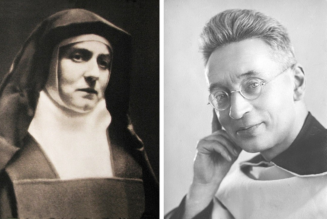, May 6, 2021

There is one argument that quiets objections to Christianity, impresses angry opponents, and subtly undermines all counter-arguments. It has propelled the Church forward every time the Church has used it, and it has left the Church in ruins every time we have forgotten it.
Love is that argument, and Jesus lays it out most memorably in the Gospel of the Sixth Sunday of Easter, Year B.
Love is a choice — a choice to ally oneself with God.
Jesus goes into surprising detail about just how practical his commandment to love is.
“As the Father loves me, so I also love you. Remain in my love,” he says. “This is my commandment: love one another as I love you.”
The syllogism is there for all to see, but it seems incredible: If Jesus loves us as the Father loves him, when he commands us to love each other the same way, he is asking us to love each other like Persons of the Trinity.
We know what the love of the Trinity is: The Persons share one will and delight in one another. The love for the Father and Son is so great that it is another Person, the Holy Spirit; it so great that “God is love,” says St. John in the Second Reading. And love in the Trinity is so great that it is expressed in the outpouring of all creation: stars and moons, blue skies and sunsets, colorful creatures filling the jungle canopies and whales in the depths of the sea.
“I have told you this so that my joy may be in you and your joy might be complete,” Jesus says. If we love like him we will delight in each other and in him and that joy will spill out in creativity in a thousand ways.
And Jesus can command that we love, because love is in our will. We choose what we love by how we spend our time, our money, and our energy. In truly Christian communities, people sacrifice themselves to unite with Jesus, see each other as brothers and sisters, and strive to act with one heart and one mind.
This kind of love can only come from God — and Jesus makes us “friends” of God.
“I no longer call you slaves,” Jesus tells his apostles, “because a slave does not know what his master is doing. I have called you friends, because I have told you everything I have heard from my Father.”
It’s a remarkable thing, being friends with God. Aristotle taught that our true friends aren’t the ones who give us pleasure when we are with them — our tennis pal or our favorite gossip — or the ones who are useful to us — the season ticket holder or the well-connected insider. True friends love each other for themselves. “In poverty and other misfortunes of life, true friends are a sure refuge,” he said. “The young they keep out of mischief; to the old, they are a comfort and aid in their weakness, and those in the prime of life, they incite to noble deeds.”
We wouldn’t think twice about helping a true friend for hours at their home or in the hospital. We wouldn’t hesitate to share our car or our weekend to help a true friend with their problems, if it came to that. We want what our friends want and whatever opportunities or obstacles they face, we face with them.
This is what true friendship with Jesus looks like too. We don’t love him just because he consoles us or satisfies our curiosity. We don’t love him to get favors from him, now or in the afterlife. We don’t love him just because we need help raising our kids.
We love him because he is astonishingly beautiful, wise, loyal and loving. Jesus’s true friends have sacrificed everything for him, and look at everything through his eyes.
There is a beautiful image of true friendship in the First Reading: The friendship of Cornelius.
Peter was a true friend to Jesus, and so was Cornelius, so when the Lord directed them to help each other, they met up. Cornelius mistook the situation and “paid homage” to Peter. The first of the Popes corrected him and embraced him, pulling him up to his feet to stand together on the same plane as him as friends of God and friends of each other.
Cornelius knew friendship well. Just before the Christians visited his house in Sunday’s reading comes this verse in Acts: “Cornelius was expecting them and had called together his kinsmen and close friends.”
“In my opinion it was by Cornelius himself that both friends and kinsmen had been brought to a better mind,” commented St. John Chrysostom. “This is the part of a friend … that where such blessings are concerned, he takes care that his near friends shall be made partakers of all.”
Cornelius didn’t make his friends’ lives worse or constricted by introducing them to Christianity. He made them immeasurably bigger and better; in fact, they experienced a second Pentecost. This is even more astonishing when you recognize that more than just being a Gentile, Cornelius was a Centurion, commanding 100 soldiers for the enemy — the Roman conquerors who crucified Christ and would soon destroy the Temple and begin killing Christians.
But then, if you think about it, we are all “enemies” of Jesus before we are friends.
“No one has greater love than this, to lay down one’s life for one’s friends,” Jesus says in the Gospel. But when he died for us, we were definitely not his friends, said St. Gregory the Great:
“Our Lord came to die for his enemies, but he says that he is going to lay down his life for his friends, to show us that by loving, we are able to gain over our enemies, so that they who persecute us are by anticipation our friends.”
That’s what he wants us to do. He wants us to lay down our lives not just for the friends we have in the Aristotelian sense — but for friends we love the way Jesus loves us; the friends who are now enemies. That means today’s “Centurions” — the leaders who command 100 activists in the army of our opponents; people who oppose the right to life, plan to tear down the Temple of religious freedom, and will soon persecute Christians.
“The highest, the only proof of love, is to love our adversary; as did the Truth Himself,” said Gregory, “who while he suffered on the cross, showed his love for his persecutors: Father, forgive them, for they know not what they do.”
Think of St. Teresa of Kolkata loving Hindus and Muslims and atheists. Think of St. John Paul II embracing the man who shot him. Think of the families of the 21 Coptic Christians who were beheaded in Libya forgiving their assassins. This is the love Jesus commands: Love that never compromises its commitment to God and neighbor.
In the Middle East, that kind of love led to mass baptisms filling the would-be Islamic State with Christian converts. Imagine what it would do in America.
Image: Caritas by Pieter Bruegel the Elder, wiki-commons.
Tags: prayer, Sixth Sunday of Easter Year B
, Sunday Gospel, Sunday Readings
Never miss a post! Subscribe below to our weekly newsletter.
Related
Join Our Telegram Group : Salvation & Prosperity








